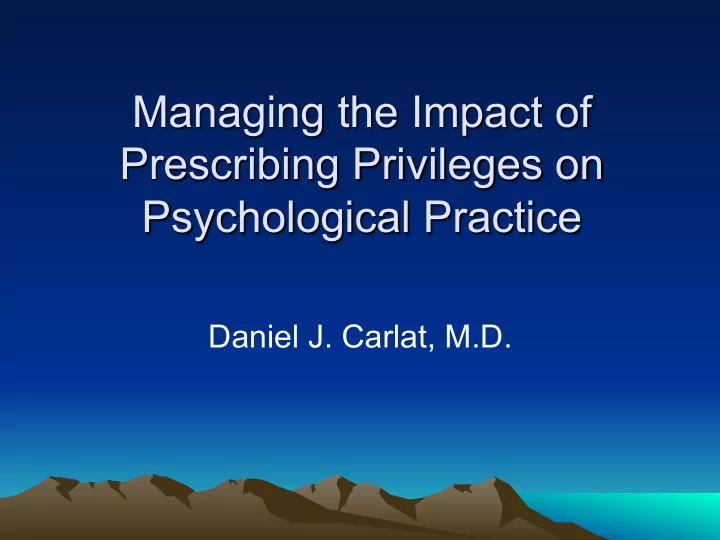

Managing the Impact of Prescribing Privileges on Psychological Practice Daniel J. Carlat, M.D.
Affiliations/Disclosures • Associate Clinical Professor of Psychiatry Tufts University School of Medicine • Publisher and Editor in Chief, The Carlat Psychiatry Report (www.thecarlatreport.com) • No financial relationships with pharmaceutical companies
Outline • My background and how I came to support prescription privileges for psychologists • General suggestions for how to be a good integrative practitioner • Specific clinical recommendations
How a nice Jewish boy turned into a turncoat psychiatrist and endorsed the RxP movement
How I ended up writing this book
Mnemonic for DSM Major Depression SIGECAPS (4/8 + poor mood or anhedonia) S leep P sychomotor I nterest S uicidality G uilt E nergy C oncentration A ppetite DSM-5 . Washington, DC: American Psychiatric Association; 2013.
Don ’ t be This Clinician
A Profession in Crisis • A Shortage of Prescribers • Psychiatric Treatment = Split Treatment • Doubts about efficacy of psychopharmacology • Manipulation of doctors by drug companies • How do we fix psychiatry?
Responses to Unhinged
Responses to Unhinged
Integrative Treatment • “Tranquilizers and psychotropic drugs serve as a life jacket--they keep you afloat, but they do not show you the way back to shore." Ingeborg Van Pelt, “Where Is the Hurt? How Do We Help?” Clinical Psychiatry News 37 (6) (2009):10
Trends in Psychotherapy by Psychiatrists • 1997: 44% of psychiatric visits included therapy; 19% provided therapy to all patients • 2005: 29% of visits included therapy; 10% provided therapy to all patients • Mojtabai R and Olfson M, National Trends in Psychotherapy by Office- Based Psychiatrists, Arch Gen Psychiatry. 2008;65(8):962-970
Combination vs. Meds only • 1998 – Meds + Therapy: 40% of patients; – Meds only: 44% – Therapy only: 16% • 2007 – Meds + Therapy: 32% of patients; – Meds only: 57% – Therapy only: 11% • Olfson and Marcus, National Trends in Outpatient Psychotherapy , Am J Psychiatry August 4 2010, AJP in Advance
Strategies to Enhance Integrative Treatment 1. Understand your patients’ expectations 2. Rapidly narrow down the diagnosis 3. Determine the most promising medication possibilities 4. Determine the most promising therapy techniques 5. Decide how to combine these
Rapid Diagnosis 1. Start with open ended questions 2. After 5 minutes, you should have 4 diagnostic hypotheses 3. Investigate hypotheses with screening and probing questions
Diagnostic Mnemonic D epressed Patients Sound Anxious, So Claim Psychiatrists 1. Depression and mood d/o’s 2. Psychosis 3. Substances 4. Anxiety 5. Somatic 6. Cognitive 7. Personality
Most Promising Meds 1. Depression … Bupropion, SSRIs, etc Bipolar … Lithium, lamotrigine, atypicals 2. Psychosis … Low side effect atypicals 3. Substances … Naltrexone, acamprosate, Suboxone 4. Anxiety … SSRIs/SNRIs, benzos 5. Somatic … Few choices 6. Cognitive … Aricept et al. 7. Personality … Few choices
Promising Psychotherapy Techniques 1. Cognitive Behavioral Therapy 2. Psychodynamic therapy 3. Dialectic behavioral therapy 4. Motivational interviewing 5. Psychoeducation 6. Family therapy 7. Misc: hypnosis, relaxation, pet therapy, doll therapy, etc … .
PTSD • Meds: SSRIs, prazosin • Therapy: – Cognitive restructuring – Exposure – Imagery rehearsal
Anxiety Disorders • Meds: Almost everything • Therapy: – Exposure hierarchy – Breathing retraining
Schizophrenia • Meds: A range of antipsychotics • Therapy: – Hallucination coping – Attribution shifting – Compartmentalizing symptoms – Talking back to the voices – Enlist a support network
Substance Use Disorders • Meds: Naltrexone, acamprosate, Suboxone, Antabuse • Therapy: – Motivational interviewing – DBT – Encouraging 12 step program participation
Questions/Discussion • To contact me: Daniel.carlat@gmail.com • Website: www.thecarlatreport.com
Recommend
More recommend